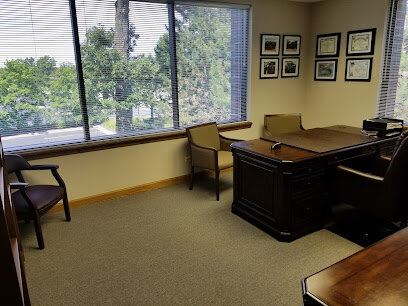Best Juvenile Law Lawyers in Wheaton
Share your needs with us, get contacted by law firms.
Free. Takes 2 min.
List of the best lawyers in Wheaton, United States
About Juvenile Law in Wheaton, United States
Juvenile law covers legal matters involving minors - generally people under 18 years old - who are accused of delinquent acts, who are abused or neglected, or who need court-ordered services. In Wheaton, which is in DuPage County, juvenile matters are handled through the local juvenile division of the circuit court and by county agencies that enforce court orders, provide probation supervision, and offer rehabilitative services. The system emphasizes rehabilitation and protection over punishment, but serious cases may result in detention or transfer to adult court under certain circumstances. Parents and guardians play a central role in juvenile proceedings, and minors have constitutional protections including the right to counsel and the right to due process.
Why You May Need a Lawyer
Juvenile cases can have long-term consequences for schooling, employment, driving privileges, and a young person’s record. You may need a lawyer in situations such as:
- A minor is accused of a criminal or delinquent act, including theft, assault, drug possession, or vandalism.
- Child protective services are investigating allegations of abuse or neglect, or the state is seeking removal or placement of a child.
- School discipline involves a potential expulsion or referral to juvenile court for behavior on or off campus.
- The state seeks to transfer a juvenile to adult court, or to impose probation, detention, or placement in a residential facility.
- You need help sealing or expunging a juvenile record, or understanding how juvenile adjudications affect future rights and opportunities.
- A parent or guardian faces allegations of contributing to the delinquency of a minor or is involved in custody and dependency proceedings.
Local Laws Overview
Juvenile matters in Wheaton follow Illinois state juvenile law and local court procedures administered by the DuPage County court system. Key local and state aspects to understand include:
- Jurisdiction and age - The juvenile court generally handles matters involving minors. The precise age boundaries and rules for transferring cases to adult court can vary by case type and are governed by state law and court practice.
- Case types - Common proceedings include delinquency cases, dependency and neglect cases, status offense matters (such as truancy or running away), and petitions for wardship or custody.
- Detention and diversion - For lower-level offenses or first-time incidents, local agencies often offer diversion programs that avoid formal adjudication in exchange for counseling, restitution, or community service. For serious allegations, short-term detention in a juvenile facility may occur pending hearings.
- Probation and supervision - If adjudicated, a juvenile may receive probation with terms such as counseling, electronic monitoring, curfews, school attendance, or participation in treatment programs administered by county probation services.
- Rehabilitation focus - Local practice emphasizes rehabilitative services, education, and family involvement. Judges and juvenile officers commonly consider treatment plans and community-based options before imposing secure confinement.
- Records and sealing - Juvenile records are treated differently than adult criminal records. In many cases, records can be sealed or expunged after certain conditions are met. Local court clerks and attorneys can explain eligibility and the process for sealing juvenile records.
Frequently Asked Questions
What happens when a juvenile is arrested or taken into custody?
When a juvenile is taken into custody, the police or probation officer will follow procedures required by law, including notifying a parent or guardian. The child may be released to a parent, placed in a short-term shelter, or held in a juvenile detention facility pending a hearing. A petition may be filed in juvenile court alleging delinquency or dependency, and an initial hearing will determine detention and next steps.
Does a juvenile have the right to an attorney?
Yes. Minors have the right to legal representation in juvenile court. If the family cannot afford a lawyer, the court may appoint a public defender or court-appointed attorney to represent the child. It is important for a guardian or the juvenile to request counsel as early as possible.
Can juvenile cases result in adult criminal records?
Most juvenile adjudications do not appear on adult criminal records, but some serious cases may be transferred to adult court depending on the offense, the minor’s age, and state law. Even without transfer, certain outcomes can affect future background checks. Sealing or expungement options may be available to limit future impact.
What is diversion and how does it work?
Diversion is an alternative to formal court adjudication. It typically involves participation in programs such as counseling, community service, restitution, or educational classes. Successful completion often results in dismissal of the matter and no juvenile adjudication on the record. Diversion eligibility depends on the nature of the offense and the juvenile’s history.
How do dependency or neglect proceedings differ from delinquency cases?
Dependency or neglect proceedings address the safety and welfare of a child when there are allegations of abuse, neglect, or parental unfitness. The focus is on protecting the child and arranging services or placement, not on punishment. Delinquency cases focus on alleged unlawful behavior by the juvenile and emphasize rehabilitation or accountability for offenses.
What are typical outcomes in juvenile court?
Outcomes range from dismissal or diversion to probation, community service, restitution, counseling, school-based interventions, or placement in a residential program. In rare or severe cases, a judge may order secure detention or placement in a state juvenile facility. The court tailors outcomes to the youth’s needs and public safety considerations.
How can records be sealed or expunged?
Sealing or expungement rules vary by state and by case. Many juvenile records can be sealed after a set period or after successful completion of probation or diversion. The process often requires filing a petition with the court and may have eligibility requirements. An attorney or court clerk can explain local procedures and deadlines.
Will school discipline be handled by juvenile court?
Not usually. School discipline and juvenile court are separate systems. However, certain school incidents may lead to police involvement and subsequent juvenile charges. Schools may also impose suspensions or expulsions that can affect a student independently of any court action.
What should parents do if child protective services are involved?
If child protective services investigate, cooperate while protecting the child’s rights. Parents should seek legal advice immediately to understand the allegations, their rights, and how to respond. An attorney can help with hearings, reunification plans, and negotiations with child welfare agencies.
How do I find the right juvenile defense lawyer in Wheaton?
Look for lawyers with specific experience in juvenile and family law, preferably with local court experience in DuPage County. Ask about their track record with diversion, probation, and record-sealing cases. Discuss fees, payment plans, and whether they offer an initial consultation. If you cannot afford private counsel, request court-appointed counsel at the earliest hearing.
Additional Resources
Helpful local and state resources include county juvenile court services and probation offices, the DuPage County circuit court juvenile division, and state agencies that oversee juvenile justice and child welfare. Other important resources are the state Department of Juvenile Justice, the Department of Children and Family Services for abuse or neglect matters, local legal aid organizations that offer low-cost or free representation, and the state bar association which can provide attorney referral services and information on finding qualified juvenile law attorneys. School counselors, court-appointed special advocates, and community youth service programs can also assist families navigating the system.
Next Steps
If you or a family member needs legal help with a juvenile matter in Wheaton, consider these steps:
- Act quickly. Juvenile cases move fast and deadlines matter for hearings and filings.
- Gather documents. Collect school records, police reports, medical records, and any communication related to the case.
- Seek legal representation. Contact a juvenile defense attorney or request a public defender if you cannot afford one.
- Attend all hearings and follow court orders. Missing hearings can lead to detention or other adverse outcomes.
- Explore diversion and rehabilitation options. Courts favor solutions that address underlying issues and support the youth’s return to school and community.
- Ask about record-sealing options. If eligible, pursue sealing or expungement to protect future opportunities.
- Reach out to local support services. Counseling, substance-abuse treatment, educational support, and family services can strengthen your case and help the youth meet court requirements.
Remember that this guide provides general information and is not a substitute for legal advice. Contact a qualified local attorney to discuss the specific facts of your situation and your legal options.
Lawzana helps you find the best lawyers and law firms in Wheaton through a curated and pre-screened list of qualified legal professionals. Our platform offers rankings and detailed profiles of attorneys and law firms, allowing you to compare based on practice areas, including Juvenile Law, experience, and client feedback.
Each profile includes a description of the firm's areas of practice, client reviews, team members and partners, year of establishment, spoken languages, office locations, contact information, social media presence, and any published articles or resources. Most firms on our platform speak English and are experienced in both local and international legal matters.
Get a quote from top-rated law firms in Wheaton, United States — quickly, securely, and without unnecessary hassle.
Disclaimer:
The information provided on this page is for general informational purposes only and does not constitute legal advice. While we strive to ensure the accuracy and relevance of the content, legal information may change over time, and interpretations of the law can vary. You should always consult with a qualified legal professional for advice specific to your situation.
We disclaim all liability for actions taken or not taken based on the content of this page. If you believe any information is incorrect or outdated, please contact us, and we will review and update it where appropriate.









